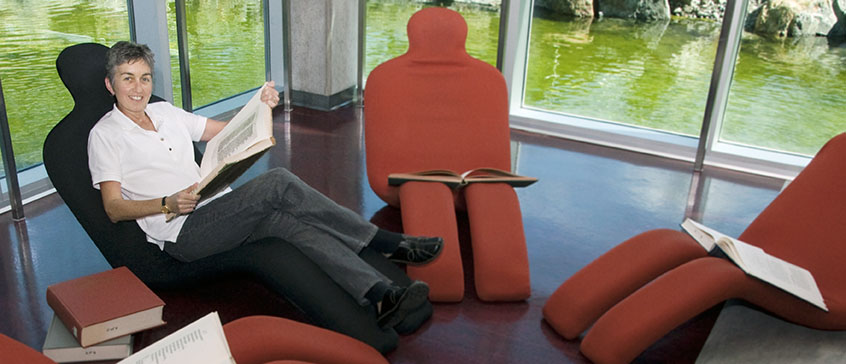Home / Humanities, Social Sciences and Law / Valerie Small
Valerie Small

Valerie Small has been a prison guard, briefly considered a career in journalism, and has spent the last 17 years working in radiation therapy.
So what is Small doing in the Humanities Diploma Program? Being over 40, she fits the profile of many of the people taking courses in history, classical traditions, literature, language and philosophy. But those enrolled all have their own reasons for studying the humanities.
I don’t need a degree or a diploma to put on my wall. It’s what I get out of it for my own edification.
– Valerie Small
Working in the science and technology field every day, “I wanted to challenge the other side of my brain,” Small says.
With her children grown and out of the nest, Small wanted a new challenge beyond her full-time job.
“I don’t need a degree or a diploma to put on my wall. It’s what I get out of it for my own edification.”
After an introductory course in humanities, Small finished a two-term History of Modern Europe course, the content covering 500 years. Although never interested in taking a history course before, it awakened a thirst for a knowledge of the past that she never knew she had.
“I feel like there is a whole part of the world that opened up to me,” Small says. “Now it’s not just recognizing names of battles, now I know something about it.”
In addition to that, Small would love to revisit some of the sites she saw on a European back-packing trip some two decades ago. “A certain amount of it was lost on me (historically). I would love to go back and see it through new eyes.”
A fit, energetic, people person, Small also enjoyed interacting with her classmates: whether it was the seniors in her introductory course, or the 20-something students a generation her junior in her history class.
“Initially I felt like an oddball but my classmates were great. They never made me feel old,” she says.
- Posted April 18, 2019
More student stories
- Public Relations student wins a podcast award for On Notice
- Business graduate makes a positive career pivot
- Public Relations student is awarded the 2023 Denis Racine Bursary
- Navigating a career transformation through public relations
- Broadening your perspective and knowledge of palliative care
Visit Registration
2nd Floor | Continuing Studies Building University of Victoria Campus 3800 Finnerty Road | Victoria BC | CanadaTel 250-472-4747 | Email uvcsreg@uvic.ca
2025 © Continuing Studies at UVic
Legal Notices |
Sitemap

